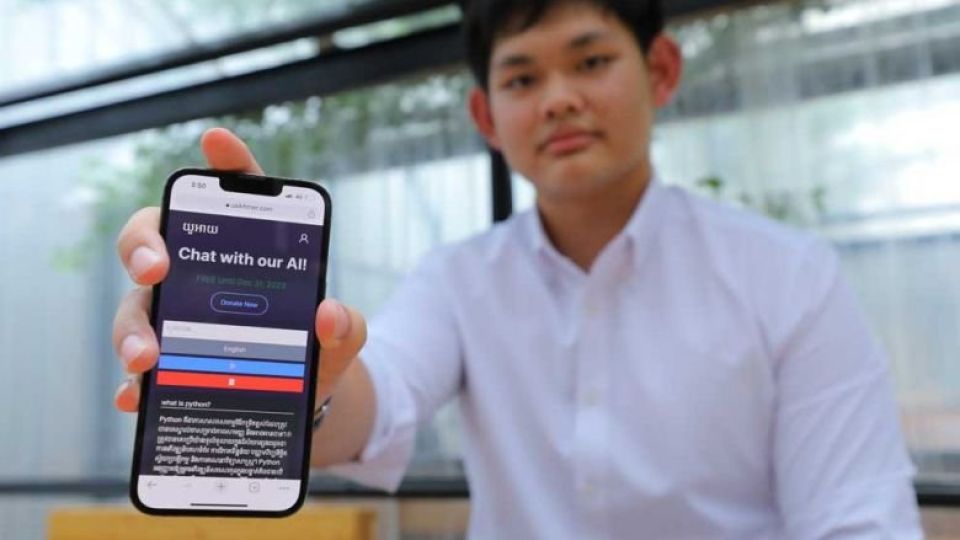August 7, 2023
PHNOM PENH – In an exciting move, the Ministry of Post and Telecommunications has announced that preparations are underway for the introduction of the Khmer version of ChatGPT, a sophisticated artificial intelligence (AI) tool.
The digital committee at the ministry is closely involved in examining the system, holding detailed conversations with the developers to ensure that the unique aspects of the Khmer language are accurately represented and catered for.
As anticipation builds among users, one local-born university student, Pang Voreh Uddom, has undertaken the significant task of addressing the digital language divide in his home country.
Studying Computer Science at Swinburne University in Melbourne, Australia, the native of Phnom Penh saw an opportunity to create a localised version of the popular AI tool, ChatGPT. His brainchild – UAI: AI Khmer Search Engine – aims to make AI more accessible for Cambodian users.
“The app is designed to cater to Cambodian users who may encounter a language barrier with ChatGPT. It will simplify their access to the necessary information,” Uddom told The Post.
Uddom’s inspiration stems from the realisation that ChatGPT, with its global following, was inaccessible to Cambodian users due to location restrictions and the requirement of a virtual private network (VPN).
Motivated by his desire to help his fellow Cambodians in their academic and professional pursuits, Uddom took it upon himself to find a solution.
When ChatGPT was launched in April, during Uddom’s holiday in Cambodia, he experienced the frustration of being unable to use this innovative AI tool firsthand. This hurdle sowed the seeds for the creation of the UAI app.
He understood that using ChatGPT effectively required a solid grasp of the website, so he seized the opportunity to develop a more user-friendly version in the Khmer language.
Uddom’s app operates similarly to ChatGPT. It allows users to pose questions and receive answers in both Khmer and English languages.
“I began developing the UAI app for widespread usage. However, as the user base grew, it started to crash and experienced various issues,” he revealed.
UAI’s design is intuitive, with natural language generation that mimics human interaction, making tasks simpler and processes smoother for users.
Not only have Uddom’s efforts earned him praise among his peers, but they have also piqued the interest of Cambodians seeking to enrich their digital experience.
Introduced in late April, UAI received a warm reception. Initially, the app was limited to 100 users. Now, Uddom is working to improve its performance and is planning to release an update to make UAI free and accessible to everyone.
“UAI is a resource that continuously learns and evolves. It stores users’ historical data to provide smarter and more personalised results,” explained the ambitious 20-year-old student.
Uddom recognises that developing the UAI app presented unique challenges. A primary hurdle was the limited data available in Cambodia, which sometimes compromised the accuracy of responses to user queries.
He plans to address this issue by using future data and user input to refine the model. As a solo project, UAI’s development also requires Uddom to singlehandedly maintain and update the software.
Despite the freedom and creative control Uddom enjoys by developing the UAI app independently, this independence brings its own set of challenges.
“Both the website and the app are not yet running smoothly, and I’m eager to receive feedback on bugs and gradually implement fixes,” he said.
Developing the AI Khmer search engine – given the increasing relevance of AI technology in simplifying various tasks – demanded considerable time and effort, especially as Uddom was working on it alone.
Yet, undeterred by these obstacles, Uddom remains steadfast in his commitment to making the UAI app a valuable tool for his compatriots. His drive to improve digital accessibility has led him to find ways to reduce the app’s operating costs.
Initially priced at $3 per user, Uddom plans to offer the UAI app for free until the end of the year, fostering wider adoption and allowing more users to benefit from this innovative tool.
UAI, like ChatGPT, uses Google as a data source. However, the Khmer language data available on Google is not as expansive as its English counterpart, which presents certain limitations.
“The data provision is still limited and not presented in a clear format. There’s an issue with AI technology retrieving information from Google, which can include both accurate and inaccurate data. I advise users not to rely entirely on AI-generated information,” he said.
Uddom plans to train the model more as more documents or data become available to ensure accuracy for his audience.
“To rectify this problem, the data has to increase, and I believe it will in the future. With more users, I could use that data to train the model,” he proposed.
Recognising the need for partners to overcome challenges effectively, Uddom has extended the free usage of UAI’s website until the end of this year.
However, with UAI being a free search engine, he currently lacks the funds to assemble a team to support its development.
“UAI currently faces financial constraints for Khmer language services, leading to its temporary suspension,” he disclosed.
He is exploring ways to cut costs, with API expenses proving too high for the project.
Outside of his work on the UAI app, Uddom is committed to equipping Cambodians with digital skills. He generates his main income by providing coding lessons, both online and in-person. He currently teaches around 300 students, a figure set to more than double to 700 next month, with a particular focus on website and app coding.
Uddom also collaborates with a video producer on independent projects for companies and institutions, with a focus on social media content.
Recognised as a rising digital talent in Cambodia, Uddom has been invited by the Faculty of Information and Communication Technology at Rangsit University International College (RIC) in Thailand to speak at their webinar, themed “AI-volution: Journey into the Future of Work”, on August 3.


